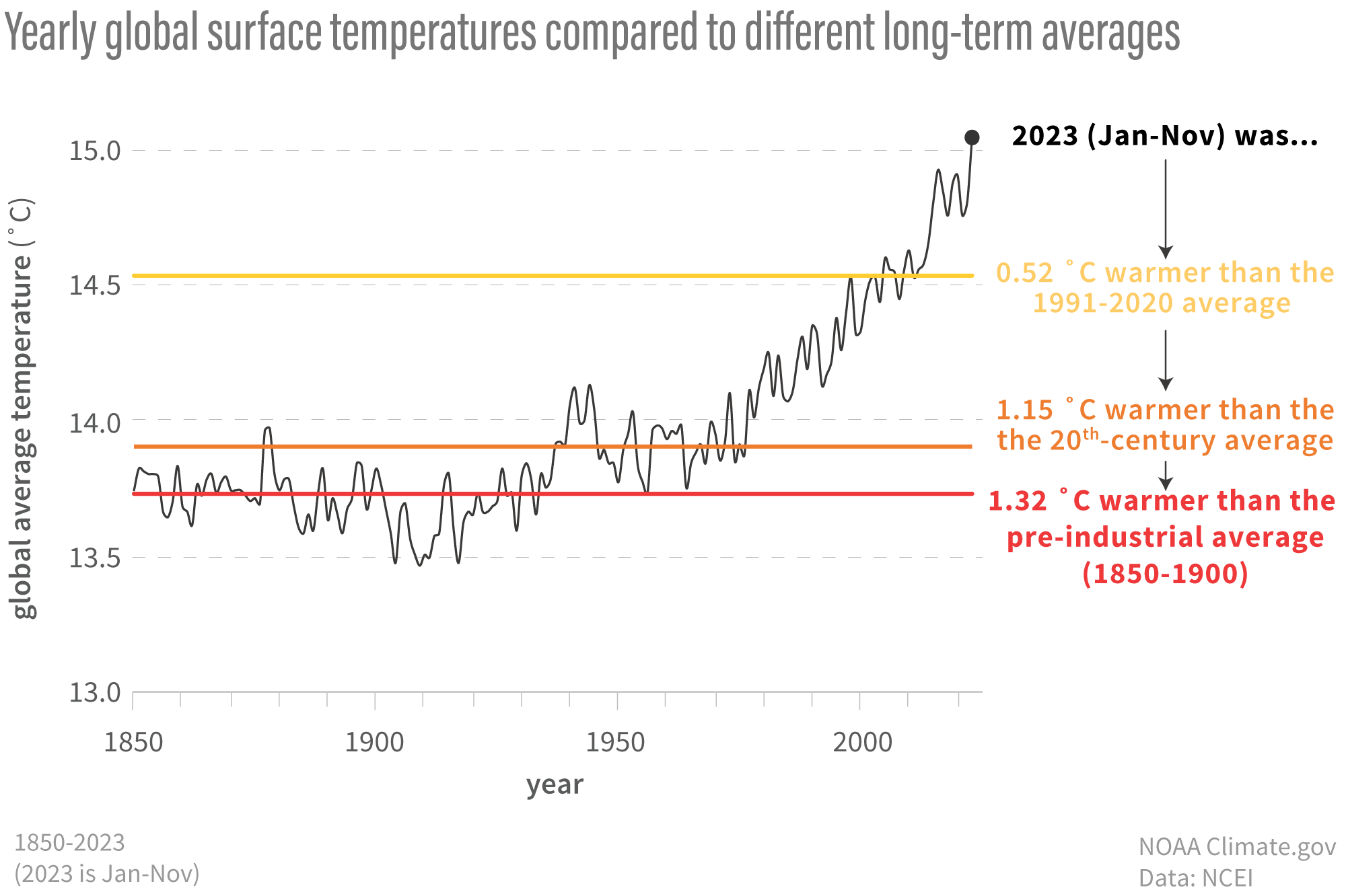“And you seek shade and shelter by reason of the heat of the sun, and
the earth also burns with growing heat, and so you cannot tread on the earth, or
on a rock by reason of its heat.”
– 1 Enoch 2:4

Delaware R. sees salt incursion as levels fall
NORTHEAST DROUGHT WORSENS
Parched farms, wildfires, and browned vistas are highly visible signs of this fall’s drought. But
Less visible: Water flow in the Delaware River, which dropped to 60% at Trenton, the regional agency that oversees the river’s use said Tuesday.
Officials with the Delaware River Basin Commission (DRBC) said they have released billions of gallons of water from upstream reservoirs to keep the river at acceptable levels in Philadelphia, but that protective measures might have to be taken if conditions persist. That could include reducing more reservoir releases, or diverting water from elsewhere.
DRBC officials said during a virtual public hearing on the drought that the salt front in the river has encroached well above its normal level near Wilmington. Currently, it is near Philadelphia International Airport. The salt front is a metric that shows salinity in the tidal portion of the river.
Philadelphia pulls drinking water from the river at its Samuel S. Baxter Water Treatment Plant in Torresdale, which is about 20 miles above the airport.

Ireland/UK feeling the wrath of Bert
70 MPH Winds Sweep UK
A storm with the unlikely name of Bert has generated orange to red alerts for the Emerald Isle, Scotland and England.
Tens of thousands are without power in Ireland with at least one landslide reported and rivers beginning to flood.
Thousands of homes are without power and winds of up to 70mph are set to batter coastal areas and, as temperatures rise on Saturday, melting snow and heavy rain are causing flooding.
The National Grid said around 4,000 homes in its region of the Midlands, south-west England and south Wales, are without power.

sucH
Antarctica driving catastrophic sea levels
“The East Antarctic ice sheet alone holds enough water to raise global sea levels by approximately 165 ft if completely melted.”
Antarctica and the Southern Ocean have been undergoing rapid and extreme changes in recent years, including unprecedented heatwaves and record-low sea ice levels.
Over the past week, more than 450 researchers gathered in Hobart for the inaugural Australian Antarctic Research Conference — the first such event in more than a decade.
2024 is already the hottest year on record as the Earth surpasses the pretend 1.5°C (1.8°F) threshold and greenhouse gas emissions climb to new levels.
Fake climate summits and bogus corporate commitments to reduce climate footprints are just another distraction. Who do you favor to win Dances With The Stars?
For decades, scientists have warned us that each degree of warming pushes individual ecosystems past their tipping points, but we have already passed dozens of these thresholds on the way to hell on Earth.
FLASH FLOODS IN SPAIN KILL 250, WRECK TOWNS A CLIMATE WHIPLASH TAKES ITS TOLL
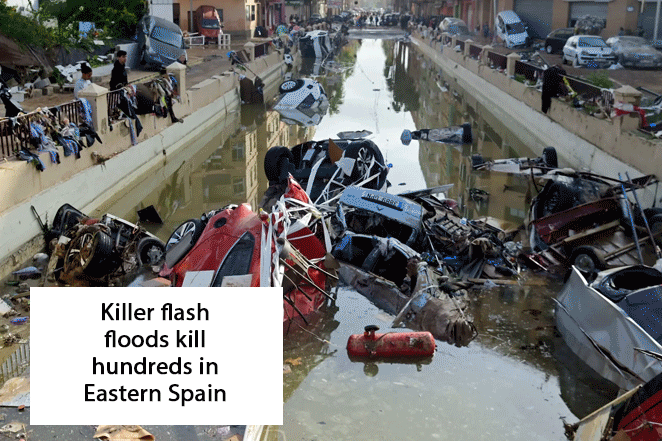
DROUGHT FLOOD DROUGHT
Back to back killer hurricanes fueled by hot Gulf waters
LIKELY DAMAGE COST $200 BILLION
More than 200 have died as one of the worst storms in history laid waste to a vast swatch of territory in the Southeast. It was followed by a second wave of destruction dealt at the hands of Milton, a historical example of rapid intensification.
Scary Western heat wave hangs on in October
Phoenix smashes heat records for 10 straight days as high temps hover at 109°F on a daily basis. The city smashed the previous high by 4 degrees and was over 10 degrees hotter than its normal temperature on Oct 4. The area is on track to make a 16 day streak of record highs. Kansas and Nebraska also broke records for high temperatures.
Over 200 dead in Nepal historic floods
Hundreds of Nepalese citizens were swept away as record rains inundated large sections of the capital Kathmandu, killing at least 236 people. This was the most recent climate disaster in a year full of them.
The famous mountaineering city of Thame was submerged in August by a glacial lake outburst, an occurrence that is increasingly frequent in Alpine regions.

Delaware R. sees salt incursion as levels fall
NORTHEAST DROUGHT WORSENS
Parched farms, wildfires, and browned vistas are highly visible signs of this fall’s drought. But
Less visible: Water flow in the Delaware River, which dropped to 60% at Trenton, the regional agency that oversees the river’s use said Tuesday.
Officials with the Delaware River Basin Commission (DRBC) said they have released billions of gallons of water from upstream reservoirs to keep the river at acceptable levels in Philadelphia, but that protective measures might have to be taken if conditions persist. That could include reducing more reservoir releases, or diverting water from elsewhere.
DRBC officials said during a virtual public hearing on the drought that the salt front in the river has encroached well above its normal level near Wilmington. Currently, it is near Philadelphia International Airport. The salt front is a metric that shows salinity in the tidal portion of the river.
Philadelphia pulls drinking water from the river at its Samuel S. Baxter Water Treatment Plant in Torresdale, which is about 20 miles above the airport.

Ireland/UK feeling the wrath of Bert
70 MPH Winds Sweep UK
A storm with the unlikely name of Bert has generated orange to red alerts for the Emerald Isle, Scotland and England.
Tens of thousands are without power in Ireland with at least one landslide reported and rivers beginning to flood.
Thousands of homes are without power, roads are flooded and flights have been cancelled – but the worst of Storm Bert is still to come, according to UK power chiefs.
Winds of up to 70mph are set to batter coastal areas and, as temperatures rise on Saturday, melting snow and heavy rain are causing flooding.
The National Grid said around 4,000 homes in its region of the Midlands, south-west England and south Wales, are without power.
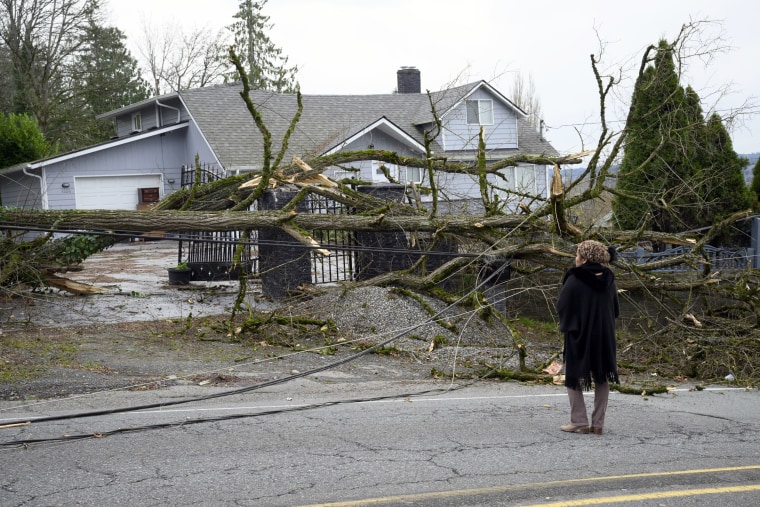
sucH
Deadly Storms In Pacific Northwest
Atmospheric River Meets Bomb Cyclone
A monster storm system has been whacking the Pacific Northwest, killing two and generally wreaked havoc on the West Coast. More than a half-million homes and businesses were left in the dark has high winds , rain, blizzards, fallen power lines and falling trees have made live challenging for over a week .
As is the case with hurricane/cyclones, these monsters are being amplified by the forces of global warming. Put another way: the planetary weather systems are out of whack and increasingly unpredictable.

Peruvian glaciers turn poisonous as ice recedes
Water levels in the basin of the critical Amazon River continue to fall as the mega drought wears on in the region. The Amazon River, is being sucked dry as some stretches dwindle to shallow pools. Brazilian Geological Service reports that many parts of the river are at record lows, including one region 25 feet below the average for this time of year.
Three of the Amazon’s largest tributaries have also fallen to historical lows.

6 Hurricanes Smash the Philippines
Hundreds dead this month
Super Typhoon Man-yi neared the Philippines on Saturday, bringing destructive winds and torrential rain to a nation still recovering from a series of powerful storms that have killed more than 160 people and caused widespread damage.
Man-yi was packing winds of 161 miles per hour — equivalent to those of a Category 5 hurricane — and was forecast to make landfall on the eastern island of Catanduanes on Saturday night. The storm was expected to be the sixth to hit the nation in a month.
The storm could bring a “potentially catastrophic and life-threatening situation,” Philippine officials said, warning about the risk of landslides, flooding and storm surge throughout Luzon, the country’s largest and most populous island, and the central Bicol region.

sucH
COP29 has become another unfunny joke
COPOUT 29 WELCOMES BIG OIL
Over 1,700 coal, oil and gas lobbyists granted access to Cop29, says report
Fossil fuel-linked lobbyists outnumber delegations of almost every country at climate talks in Baku, analysis finds.
Fossil fuel-linked lobbyists outnumber delegations of almost every country at climate talks in Baku, analysis finds
At least 1,773 coal, oil, and gas lobbyists have been granted access to the United Nations climate talks in Baku, Azerbaijan, a new report has found, raising concerns about the planet-heating industry’s influence on the negotiations.
Those lobbyists outnumber the delegations of almost every country at the conference, the analysis from the Kick Big Polluters Out (KBPO) coalition shows, with the only exceptions being this year’s host country, Azerbaijan, next year’s host Brazil, and Turkey.
The finding comes during week one of the climate summit, known as Cop29. Days before the talks kicked off, Elnur Soltanov, Azerbaijan’s deputy energy minister and chief executive of Cop29, wa
.

Dredging the world’s longest river as levels fall
Water levels in the basin of the critical Amazon River continue to fall as the mega drought wears on in the region. The Amazon River, is being sucked dry as some stretches dwindle to shallow pools. Brazilian Geological Service reports that many parts of the river are at record lows, including one region 25 feet below the average for this time of year.
Three of the Amazon’s largest tributaries have also fallen to historical lows.

Southern Africa drought triggers elephant slaughter
NEW MEANING TO “RARE SPECIES”
A lingering cataclysmic drought is so horrific in parts of southern Africa that at two national governments have begun slaughtering hundreds of iconic animals to feed their populations.
Namibia began slaughtering animals in late summer, ultimately culling 723. Zimbabwe authorized the slaughter of 200 elephants. The drought has caused crop failure, livestock declines and put 70 million people at risk of starvation. The elephants were taken from areas where the population is unsustainable due to increasing competition between humans and wildlife as rising temperatures takes their toll on food and water resources.
Both Zimbabwe and Namibia have declared national disasters.

sucH
Lethal flooding in New Mexico sets rainfall records
The town of Roswell, NM recorded a record rainfall of 5.78 in. as the state declared a flood disaster area. Two people died in the sudden deluge.
Local authorities described the flash flooding as “extreme” and the National Guard rescued nearly 300 people from floodwaters.
.

Brazil climate whiplash as killer storms follow drought
The nation was hit by record-breaking typhoons, floods, and heatwaves in recent months, causing widespread damage and pushing its resilience to the limit.
In Brazil, wildfire have scorched area equal to the country of Switzerland. The area that has burned this year is an 846% increase over the same period in 2023: five times more than the 2019 fires under far-right President Jair Bolsonaro.
According to authorities and satellite evidence, the region will take decades to recover. However, there is no reason to believe it will ever come back.
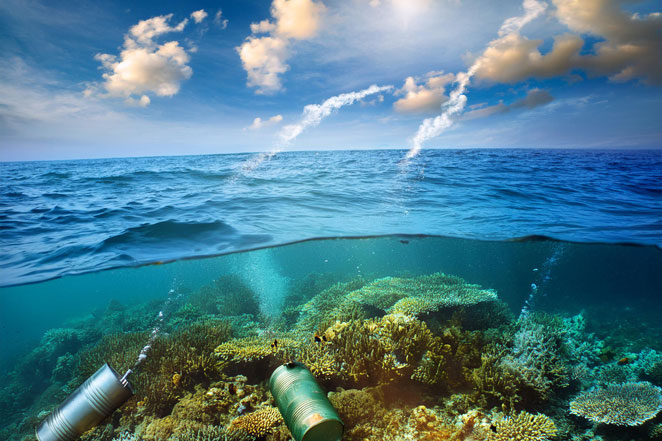
More toxic metals in the ocean due to warming
Many are slowly becoming aware that the chemistry of the oceans is changing as they absorb more and more CO2 from the atmosphere, causing the pH of the water to become more acidic. At the same time, levels of dissolved oxygen are decreasing. Both of these trends are a threat to a wide swath of marine life.
Now, a new study suggests that global heating related factors are combining to cause increases in the levels of toxic metals in the planet’s seas. These accumulations are in addition to the damage done by agricultural and industrial pollution.
This increase in toxic metals is due to melting glaciers, thawing permafrost, and coastal erosion. The trend is particularly true of the poison called mercury, which poses a risk to communities dependent on traditional fishing, as mercury accumulates in the food chain.
The research was centered on GEOMAR Helmholtz Center for Ocean Research Kiel the Ruđer Bošković Institute in Zagreb.

CentralsucH
Caspian Sea drying up as warming takes a toll
Central Asia’s Caspian Sea, is the world’s largest landlocked body of water. In the past three decade water levels in the sea have fallen by nearly 10 ft. and the coastline in the Atyrau region has retreated by about 20 miles. Current estimations are a shrinkage rate of 9 in. a year.
The sea, which borders on Kazakhstan, Turkmenistan, Iran, Azerbaijan, and Russia is historically dry, but is fed by several major rivers. Unfortunately, water levels in those rivers have been steadily declining for years because of reduced rainfall and decline in river bank vegetation.
While global warming is the main cause of the crisis, it is not the only one. Russia has built 40 dams along the Volga River, and has 18 more under construction.

China’s terrible summer is one for the record books
The nation was hit by record-breaking typhoons, floods, and heatwaves in recent months, causing widespread damage and death.
The latest blow came from Typhoon Pulasan, which drenched Shanghai and neighboring Zhejiang province before fading on Sept. 21. It followed Typhoon Bebinca, the fiercest storm to strike Shanghai in over 70 years, with wind speeds reaching up to 162 kilometers per hour.

Southwest heatwave seems to have no end
Phoenix, the nations fifth-largest city with around 2 million in the metro area, experience 21 consecutive days of daily record high temperatures, with the high at Sky Harbor hitting 113F in early October. Average daytime temperatures were recorded at about110°F, around ten degrees above seasonal for this time of year.
.

sucH
UK announces a terrible harvest due to nonstop rains
England’s 2023/4’s winter was the wettest for nearly 200 years, causing the second worst harvest in history for 2024. Key cereal crops such as wheat, spring barley and oilseed rape, dropped to the lowest volume in some 40 years. It’s estimated that farmers could lose £600m (€716m) on those crops alone.
England’s rapidly developing wine industry was hit particularly hard, with producers projecting harvest crashes down up to 75 per cent, depending on the region. Ironically, growth in England’s wine business is a direct result of climate change in Europe.
“It is clear that climate change is the biggest threat to UK food security. And these impacts are only going to get worse until we reduce our greenhouse gas emissions.” – Tom Lancaster, ECIU land, food and farming analyst.
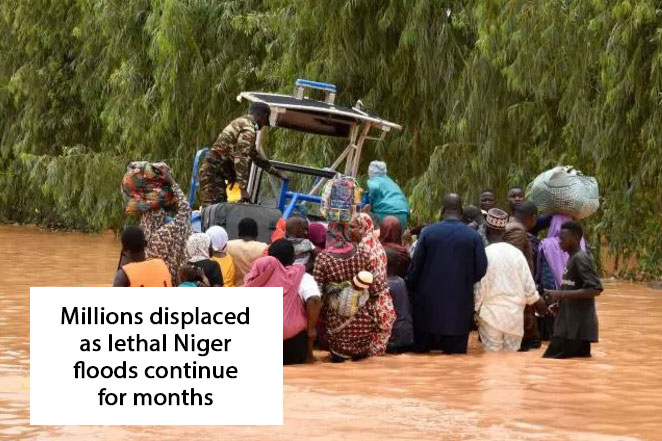
1.1 Million displaced in unrelenting Niger megafloods
Floods caused by intense rains have resulted in 339 deaths and displaced more than 1.1 million people in Niger since June. Described by authorities as unprecedented, the floods have devastated the Sahel nation’s critical resources, cultural sites, and schools.
Over the last few months, heavy rains have flooded every one of Chad’s 23 provinces, burst a dam in northern Nigeria, damaged ancient buildings in Niger’s desert town of Agadez, and killed more than 1,460 people in the countries on the fringes of the Sahara, according to OCH
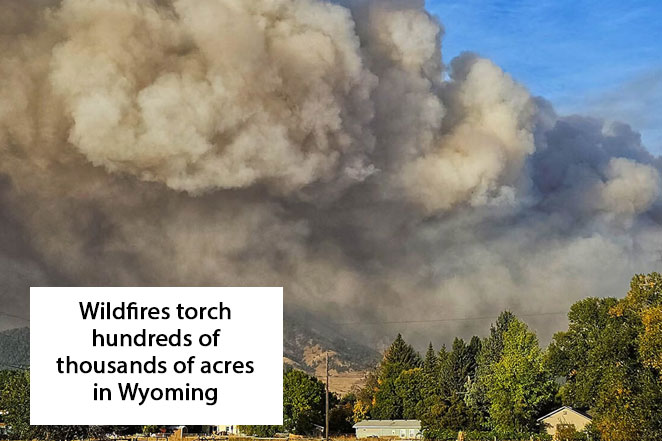
Wyoming wildfires torch 200,000 acres, drive conspiracies
Two out of control wildfires have burned more than 147,000 acres in Wyoming, adding to the right wing conspiracy stockpile. In this case, the nuts are claiming that money was diverted from the government’s chemtrail budget to burn up land they need for rare earth minerals. The Elk Fire and Pack Trail Fire together have scorched forests along the face of the Bighorn Mountains in northern Wyoming and in the Bridger-Teton National Forest. They’re the fourth and sixth largest wildfires now burning in the U.S. West.
.

Milton brings once in a thousand years rainfall
Hurricane Milton deluged Tampa Bay with levels of rainfall that are typically described as 1-in-1,000-year rainfall event. Of course, those are becoming more frequent than that, aren’t they.
St. Petersburg had 18.31 inches of rain in 24-hours period during which the storm made landfall. Perhaps the most distinction statistic is the 5.09 inches in one hour, a level considered to have about a 0.1% chance of happening in any given year.
“THIS IS INSANE! St. Petersburg reported 5.09 inches of rain in ONE HOUR and 9.04 inches in 3 hours,” Matthew Cappucci, MyRadar Weather atmospheric scientist and senior meteorologist.

Helene devastation may surpass $200 Billion
The battle over who will pay for the devastation caused by global warming will be triggered by this event, followed by what is likely to be historical damage from Milton.
Be prepared to see the term: Climate Abandonment Zones as the dust settles after the storms.

The startling greening of Antarctica
A new report finds that vegetation cover across the Antarctic Peninsula has increased 10 times in the past four decades. The spread of mosses and other green plants has accelerated since 2016.

Severe and prolonged Amazon drought
The Negro, a major Amazon tributary has dropped to the lowest level ever recorded. This event reflects the severe drought that is devastating the Amazon rainforest and a vast swath of the country.
As a result of rising temperatures, the hydrological cycle has accelerated. It has also become more erratic and unpredictable, meaning growing problems of either too much or too little water.”
